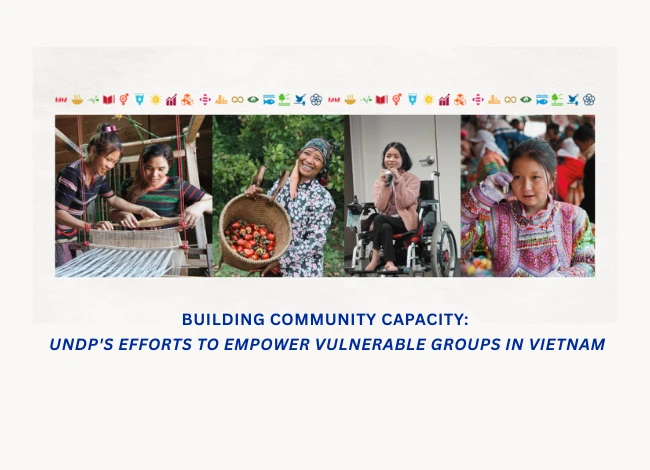The United Nations Development Programme (UNDP) has been actively involved in building the capacity of government agencies and relevant organizations to foster innovation and sustainable development. One of its prominent initiatives is the Accelerator Lab Vietnam, which serves as a social innovation lab focused on testing creative solutions to complex development challenges. As part of UNDP’s global network, which spans 90 countries, the lab aims to tackle issues such as climate change and social inequality. In Vietnam, the Accelerator Lab emphasizes promoting the circular economy, adopting new technologies like AI, and supporting vulnerable communities, including youth and people with disabilities.
The Accelerator Lab is part of the global network of Public Sector Innovation Labs (PSILs), focusing on social innovation and non-traditional approaches both inside and outside of UNDP. The lab plays a pivotal role in connecting and leveraging collective intelligence, seeking creative solutions for sustainable development. Over the years, it has formed numerous partnerships with government agencies, academic institutions, and research organizations. Accelerator Lab has utilized over 25 data sources and applied more than 18 innovation methods, ranging from ethnographic research to policy experimentation. The goal is to share international best practices and develop innovative solutions to environmental, economic, and social challenges.
The Public Sector Innovation Labs (PSILs), also known as Policy Labs, are institutional initiatives designed to promote the design and implementation of more practical and context-driven policies. These labs often consist of multidisciplinary experts and creative spaces that allow for the design, experimentation, and deployment of innovative solutions within public administration. PSILs play a crucial role in helping countries and cities address complex challenges in urban management and socio-economic development.
More than just tools for economic development or improving the quality of life, PSILs represent a new, systematic, and holistic approach that connects multiple stakeholders, including government, communities, businesses, and social organizations. These labs are built on a foundation of cooperation and collective intelligence sharing.
Global examples, such as the Accelerator Lab and CityLabs, exemplify the successful application of public sector innovation labs. These labs have contributed to promoting non-traditional solutions, experimenting with new approaches like the circular economy, developing the nighttime economy, and improving public services. Establishing PSILs within innovation management agencies not only provides a space for experimentation but also serves as a platform for creating and developing policies based on evidence and real needs. This approach has strengthened the capabilities of government agencies, encouraged experimentation, and fostered greater public-private collaboration, ultimately benefiting the people.
Key Contributions of the Accelerator Lab to Vietnam’s Startup Ecosystem
The Accelerator Lab has played a significant role in enhancing the capacity of stakeholders in Vietnam’s innovation ecosystem. It has organized numerous training programs, workshops, and capacity-building sessions for public officials, covering topics like innovation policy and creative innovation methods. In total, the lab has impacted around 1,000 public officials through activities that promote innovation in policy design and implementation. Notable initiatives include training on innovation for 600 officials in Bac Giang province in collaboration with the National Innovation Center (NIC), as well as 120 officials in workshops focused on plastic waste pollution in Ho Chi Minh City, Ha Long, and Hue in partnership with the National Startup Support Center (NSSC). These programs emphasize the use of human-centered innovation tools, such as design thinking, systems thinking, collective intelligence, and agile methods.
In addition to training, the Accelerator Lab has implemented practical initiatives like Hackathons to promote the development of public service portals in Hue, fostered changes in the approach of public officials toward marginalized groups, and scaled these methods to Quang Tri and Ha Giang.
The Accelerator Lab has contributed to the development of innovation-related policies in Vietnam. It provides research and recommendations to government agencies, leveraging local knowledge and insights to craft policies that support the startup ecosystem. For instance, its work with NIC and NATEC in developing strategies for the National Innovation Ecosystem has helped create a stronger innovation framework that directly supports startups’ access to and utilization of innovative opportunities. The lab has also assisted in policy development at the local level, such as in Da Nang, where it introduced new innovation models like CityLab and helped the city formulate a Circular Economy roadmap, directly contributing to bringing local policies closer to the people.
Connecting Stakeholders: The Accelerator Lab has served as a connector between various stakeholders in Vietnam’s startup ecosystem. It has fostered collaboration between public sector organizations, private businesses, academia, and research institutes, thereby promoting knowledge-sharing and collaboration.
Request Full Report & Join the Network
Interested in the full Vietnam Startup Ecosystem Report 2024? Join our network by making a request:
- Receive the full report for comprehensive insights.
- Get listed in the 2025 report and showcase your impact.
- Collaborate in building the next report with expert contributions.
- Sponsor the report development and gain exclusive exposure.
Stay updated on Vietnam’s innovation landscape by following us on NSSC’s official website.


